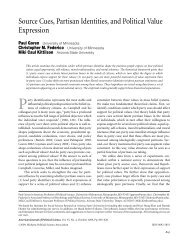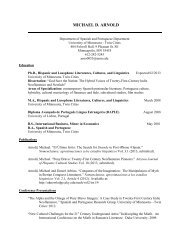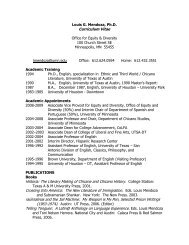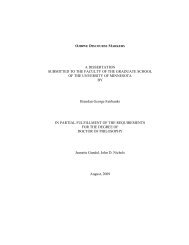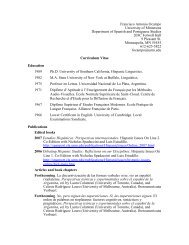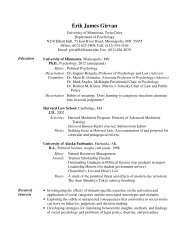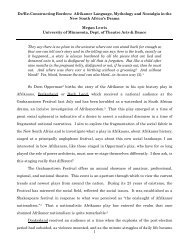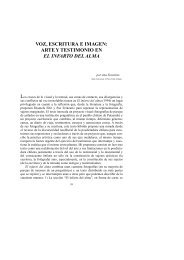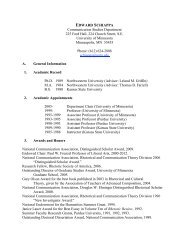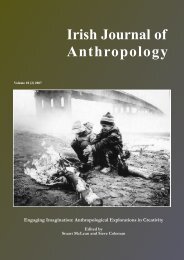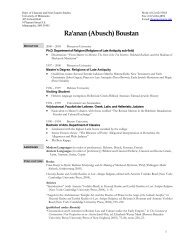Social context and cognition in SLA: a variationist perspective elaine ...
Social context and cognition in SLA: a variationist perspective elaine ...
Social context and cognition in SLA: a variationist perspective elaine ...
Create successful ePaper yourself
Turn your PDF publications into a flip-book with our unique Google optimized e-Paper software.
Stage 5 Aux-2nd, <strong>and</strong> Suppletion. This allows formation of true WH questions.<br />
Bob: What are you do<strong>in</strong>g? (Session 24 with researcher.)<br />
A <strong>variationist</strong> <strong>perspective</strong> 71<br />
Stage 6 Question tag. Allows different word orders <strong>in</strong> different clauses to express the question.<br />
Bob: You don’t like green, are you? (Session 49 with researcher.)<br />
Appendix A Developmental Stages <strong>in</strong> Bob’s English Question Formation<br />
Notes<br />
An earlier version of this chapter appeared <strong>in</strong> Tarone (2007b). I am very grateful to<br />
colleagues who have provided me with feedback on its contents: to George Yule,<br />
who helped me frame the argument more precisely, to Martha Bigelow <strong>and</strong> Bonnie<br />
Swierzb<strong>in</strong>, who provided additional suggestions, <strong>and</strong> to Dennis Preston. Bobbie<br />
Lafford’s <strong>in</strong>put on Tarone (2007a) also found its way <strong>in</strong>to this chapter. As always,<br />
errors <strong>and</strong> mis-statements are m<strong>in</strong>e alone.<br />
1. The conference that produced this volume is one, of course, but there is also the<br />
2004 special issue of the International Review of Applied L<strong>in</strong>guistics on variation<br />
<strong>in</strong> the <strong>in</strong>terlanguage of advanced L2 learners (Mougeon <strong>and</strong> Dewaele 2004); a<br />
collection of papers on learn<strong>in</strong>g <strong>context</strong> <strong>and</strong> its effects on <strong>SLA</strong> <strong>in</strong> a special issue<br />
of Studies <strong>in</strong> Second Language Acquisition (Collent<strong>in</strong>e <strong>and</strong> Freed, 2004); <strong>and</strong><br />
a special issue of Modern Language Journal (Lafford 2007), <strong>in</strong>clud<strong>in</strong>g Tarone<br />
(2007a), on the impact of Firth <strong>and</strong> Wagner’s 1997 call for an exp<strong>and</strong>ed research<br />
approach <strong>in</strong> <strong>SLA</strong> that is less focused on isolated cognitive factors, one that can<br />
accommodate situationally <strong>and</strong> <strong>in</strong>dividually specifi c variables.<br />
2. Everett (2005, 2009) shows that specifi c predictions of UG (Universal Grammar)<br />
theorists (Hauser, Chomsky, <strong>and</strong> Fitch 2002) are simply not borne out <strong>in</strong> his study<br />
of Piraha, a language used <strong>in</strong> a remote Amazonian community. Everett claims that<br />
the community’s cultural values affect the grammar of the language, so that, for<br />
example, recursion, a feature claimed <strong>in</strong> UG to be a universal characteristic of all<br />
human language, does not occur. UG, a purely psychol<strong>in</strong>guistic theory of language,<br />
thus fails to account for very signifi cant effects of social <strong>and</strong> cultural variables on<br />
the grammar of Piraha.<br />
3. Other approaches to socioognition <strong>in</strong> <strong>SLA</strong> described <strong>in</strong> this volume lack <strong>variationist</strong>s’<br />
fi eld-tested methodology for the collection <strong>and</strong> the analysis of variable<br />
sociol<strong>in</strong>guistic data us<strong>in</strong>g VARBRUL to do computer model<strong>in</strong>g of language use <strong>in</strong><br />
relation to complex, chang<strong>in</strong>g <strong>context</strong>ual variables. Another advantage for <strong>SLA</strong><br />
<strong>variationist</strong>s is that sociol<strong>in</strong>guistics have identifi ed key social variables that constra<strong>in</strong><br />
variation <strong>in</strong> all languages <strong>in</strong> systematic <strong>and</strong> predictable ways, as well as<br />
pervasive sociol<strong>in</strong>guistic processes such as ‘change from above’ <strong>and</strong> ‘change from<br />
below’ that clearly affect <strong>SLA</strong> (Preston 1989: 59–62, 244; Tarone 2007a: 844).<br />
4. ‘Change from above’ <strong>in</strong>volves a (typically) conscious shift by a speaker toward<br />
more prestigious or st<strong>and</strong>ard language forms. ‘Change from below’ <strong>in</strong>volves a<br />
less conscious process of change, <strong>in</strong>volv<strong>in</strong>g adoption of non-st<strong>and</strong>ard language<br />
forms that are often identifi ed with m<strong>in</strong>ority groups of various k<strong>in</strong>ds. Both k<strong>in</strong>ds<br />
of change occur <strong>in</strong> <strong>SLA</strong> (Preston 1989: 59–62, 244).<br />
5. Carrier (1999) also shows that social status plays a role <strong>in</strong> L2 listen<strong>in</strong>g<br />
comprehension.<br />
6. Though some may jo<strong>in</strong> with me <strong>in</strong> disagree<strong>in</strong>g with spellcheckers about st<strong>and</strong>ards,<br />
<strong>in</strong> such cases we are question<strong>in</strong>g the l<strong>in</strong>guistic competence of the human who programmed<br />
the spellchecker.<br />
04_Batstone_Ch04.<strong>in</strong>dd 71 1/27/2010 10:40:49 PM



